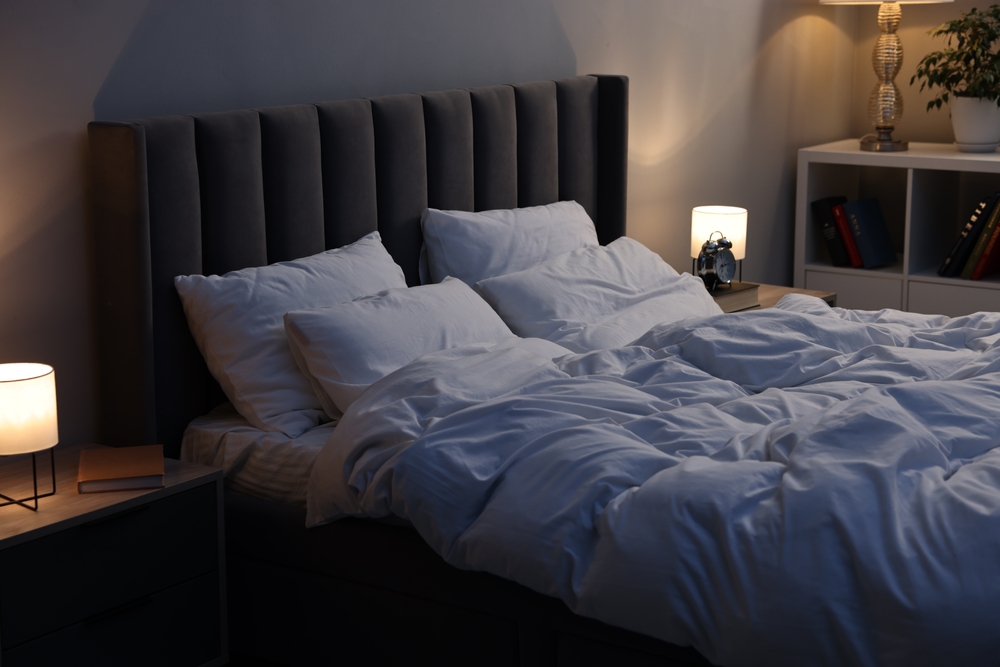10 Proven Tips for Falling Asleep Faster Tonight
Get Some Rest Right Away With the Help From Our Encino Sleep Specialist
We’ve all been there—lying in bed, staring at the ceiling, watching the minutes tick by as sleep stubbornly refuses to come. You’re exhausted, but your mind won’t quiet down, or your body just won’t relax. The frustration builds with each passing hour, knowing you’ll be dragging through tomorrow.
The good news? You don’t have to suffer through another sleepless night. Science has identified several proven strategies that can help you fall asleep faster and wake up feeling refreshed. These aren’t gimmicks or old wives’ tales—they’re evidence-based techniques that work with your body’s natural sleep mechanisms.

About Our Encino Center
At the Encino Sleep and TMJ Center, we specialize in diagnosing and treating sleep disorders and TMJ dysfunction. Led by Dr. Michael Simmons, our team provides comprehensive examinations to identify the underlying causes of conditions like sleep apnea, snoring, and TMJ-related pain. We recognize that these issues can significantly impact your daily life—from affecting your focus and energy levels to causing chronic discomfort that interferes with work and sleep. Our approach focuses on developing personalized treatment plans based on thorough evaluations.
Whether you’re dealing with sleep apnea that’s affecting your cardiovascular health or TMJ pain that’s disrupting your routine, we offer evidence-based solutions tailored to your specific condition. Our experienced team is committed to providing professional care that helps you achieve better sleep, reduce pain, and improve your overall quality of life.
If you think your difficulty sleeping may have to do with sleep apnea or other sleep disorders, contact us at (818) 300-0070.
10 Tips For Better Sleep
1. Set a Consistent Sleep Schedule
Your body has an internal clock called the circadian rhythm that regulates when you feel sleepy and when you feel alert. When you go to bed and wake up at the same time every day—yes, even on weekends—you train this clock to work more efficiently.
Research shows that maintaining a regular sleep schedule is one of the most effective ways to improve sleep quality. Your body learns to anticipate sleep at your set bedtime, making it easier to drift off naturally. Start by choosing a realistic wake-up time and stick to it for at least a week. Once that feels natural, establish a bedtime that allows for 7-9 hours of sleep.
The key is consistency. Even if you have trouble falling asleep at first, resist the urge to sleep in the next morning. Your body will adjust within a few days, and you’ll find yourself naturally getting tired at your chosen bedtime.
2. Create a Cool, Dark Environment
Temperature plays a crucial role in sleep quality. Studies have found that the optimal bedroom temperature for most adults falls between 60-67°F (15.5-19°C)[1,2]. This might feel cooler than you’re used to, but there’s good science behind it.
As your body prepares for sleep, your core temperature naturally drops. A cool room facilitates this process, helping you fall asleep faster. Research published in Science of the Total Environment found that sleep efficiency dropped by 5-10% when bedroom temperatures increased from 77°F to 86°F[3]. When rooms are too warm, they interfere with your body’s natural temperature regulation and can lead to restless, fragmented sleep.
Darkness is equally important. Light exposure suppresses melatonin production—the hormone that signals your body it’s time to sleep. Use blackout curtains, remove electronics with bright displays, or try a sleep mask to create complete darkness in your bedroom.
3. Try the 4-7-8 Breathing Technique
This simple breathing exercise, developed by Dr. Andrew Weil, can help calm your nervous system and prepare your body for sleep. The technique is rooted in pranayama, an ancient yogic breathing practice.
Here’s how to do it:
- Place the tip of your tongue against the ridge behind your upper front teeth
- Exhale completely through your mouth, making a whooshing sound
- Close your mouth and inhale quietly through your nose for 4 counts
- Hold your breath for 7 counts
- Exhale completely through your mouth for 8 counts, making a whooshing sound
- Repeat the cycle 3-4 times
A study published in Physiological Reports found that the 4-7-8 breathing technique improved heart rate variability and blood pressure by activating the parasympathetic nervous system—your body’s natural relaxation response[4]. Research on patients with chronic conditions showed that this breathing pattern reduced anxiety and improved sleep quality when practiced regularly.[5]
The more you practice this technique, the more effective it becomes. Many people report falling asleep before completing the fourth cycle once they’ve mastered the method.
4. Limit Screen Time Before Bed
We’ve all heard this advice, but it bears repeating because it’s so important. The blue light emitted by phones, tablets, and computers suppresses melatonin production, making it harder to fall asleep. A 2022 study found that smartphone use in bed led to significant increases in sleep latency—the time it takes to fall asleep.[6]
But it’s not just the light—it’s also the content. Scrolling through social media, checking work emails, or watching exciting videos keeps your brain engaged and alert when it should be winding down.
Try to avoid screens for at least one to two hours before bedtime. If you must use devices, enable night mode settings that reduce blue light, or wear blue-light-blocking glasses. Instead of screen time, use those evening hours for relaxing activities like reading a physical book, gentle stretching, or listening to calming music.
5. Use Progressive Muscle Relaxation
Progressive muscle relaxation (PMR) is a technique that involves systematically tensing and then releasing different muscle groups throughout your body. This practice helps you become aware of physical tension and learn to release it, making it easier to fall asleep.
Multiple studies have demonstrated PMR’s effectiveness for improving sleep. Research published in the Journal of Sleep Research found that people who practiced PMR before sleep spent 125% more time in slow-wave sleep—the deepest, most restorative stage—compared to those who didn’t[7]. Other studies on patients with COVID-19, rheumatoid arthritis, and postmenopausal women all found that PMR significantly improved sleep quality and reduced anxiety.[8,9,10,11]
To practice PMR:
- Start with your toes, tensing them for 5-10 seconds, then release
- Move up through your body: calves, thighs, buttocks, stomach, chest, arms, hands, neck, and face
- Focus on the contrast between tension and relaxation in each muscle group
- Breathe slowly and deeply throughout
For best results, practice PMR lying in bed as part of your bedtime routine.
6. Avoid Large Meals and Caffeine Late in the Day
What you eat and drink—and when—has a profound impact on your sleep. Caffeine is particularly problematic because its effects last much longer than most people realize.
A landmark study published in the Journal of Clinical Sleep Medicine found that consuming 400 mg of caffeine (about 4 cups of coffee) even 6 hours before bedtime significantly disrupted sleep, reducing total sleep time by more than one hour.[12] More recent research published in Sleep in 2024 found that even 12 hours before bedtime, high doses of caffeine can affect sleep quality, particularly reducing deep sleep stages.[13,14]
The recommendation? For a standard cup of coffee (about 100 mg of caffeine), avoid consumption within 4 hours of bedtime. For larger amounts, give yourself at least 8-13 hours before sleep.
Heavy meals close to bedtime can also interfere with sleep by causing discomfort and disrupting your body’s natural overnight processes. Try to finish dinner at least 3 hours before bed. If you need an evening snack, choose something light like a banana with a tablespoon of peanut butter or whole wheat crackers with low-fat cheese.
7. Exercise Regularly (But Not Too Late)
Physical activity is one of the most powerful sleep aids available. A 2024 study published in Nature Scientific Reports found that people who engaged in moderate to vigorous physical activity during the day fell asleep more quickly than those who were sedentary.
Exercise helps regulate your circadian rhythm, reduces stress and anxiety, and increases time spent in deep sleep. However, timing matters. Vigorous exercise too close to bedtime can be stimulating and make it harder to fall asleep.
Aim to finish intense workouts at least 3-4 hours before bed. If you prefer evening exercise, opt for gentler activities like yoga, stretching, or a leisurely walk. Morning or afternoon workouts are ideal for maximizing sleep benefits without disrupting your ability to fall asleep at night.
8. Reserve Your Bed for Sleep Only
Your brain creates powerful associations between environments and activities. If you regularly work, watch TV, or scroll through your phone in bed, your brain begins to associate your bed with wakefulness and activity rather than sleep.
Sleep experts recommend using your bed only for sleep (and intimacy). This classical conditioning helps your brain recognize that when you get into bed, it’s time to sleep. Keep laptops, work materials, and even books for reading elsewhere if possible.
If you can’t fall asleep after about 20 minutes, get out of bed and do a quiet, relaxing activity in low light until you feel sleepy. This prevents your bed from becoming associated with frustration and wakefulness.
9. Try White Noise or Calming Sounds
For many people, complete silence isn’t actually ideal for sleep. Random noises—a car door slamming, a dog barking, a partner snoring—can jolt you awake throughout the night. White noise, pink noise, or other ambient sounds create a consistent auditory blanket that masks these disruptive noises.
Research suggests that songs with 60-80 beats per minute can help promote relaxation and sleep.[15] Many people find success with:
- White noise machines or fans
- Nature sounds (rainfall, ocean waves, forest sounds)
- Calming instrumental music
- Sleep-specific apps or playlists
Experiment with different sounds to find what works best for you. Some people prefer silence, while others sleep better with gentle background noise. The key is consistency—whatever you choose, use it every night to create another sleep cue for your brain.
10. Get Up If You Can’t Sleep After 20 Minutes
This might seem counterintuitive, but one of the worst things you can do when you can’t sleep is to lie in bed trying harder to fall asleep. This creates performance anxiety and further strengthens the association between your bed and wakefulness.
If you’ve been lying awake for about 20 minutes, get out of bed and do a quiet, non-stimulating activity in dim lighting. Try:
- Reading a book (a physical one, not on a screen)
- Gentle stretching or progressive muscle relaxation
- Listening to calming music or a podcast
- Doing a puzzle or coloring
Avoid bright lights, screens, work, or anything that requires significant mental engagement. When you start to feel sleepy again, return to bed. This technique, sometimes called stimulus control, is a core component of cognitive behavioral therapy for insomnia and has strong research support.
Building Your Personal Sleep Success Plan
Falling asleep faster isn’t about finding one magic solution—it’s about creating the right conditions and habits that work with your body’s natural sleep mechanisms. The ten strategies outlined here are all supported by scientific research and can make a real difference in your sleep quality.
Start by choosing 2-3 techniques that resonate with you and commit to trying them consistently for at least a week. Keep in mind that building new sleep habits takes time—your body needs to adjust to new routines. Be patient with yourself, and don’t get discouraged if you don’t see immediate results.
Remember, quality sleep is one of the pillars of good health, affecting everything from your mood and productivity to your immune system and long-term disease risk. Investing time in improving your sleep is one of the best things you can do for your well-being.
Sweet dreams, and here’s to finally getting the restful night’s sleep you deserve!
You’ve Suffered Long Enough—Let Us Help You Sleep Again
You deserve more than restless nights and exhausted mornings. If you’ve tried everything and still can’t get the restorative sleep your body needs, it’s time to seek professional help. At The Encino Center for Sleep & TMJ Disorders, we understand how sleep issues affect every aspect of your life—your relationships, your work, your health, and your happiness. Our experienced team specializes in diagnosing and treating sleep disorders with personalized care that gets to the root of your problem.
Whether you’re in Encino, Sherman Oaks, Tarzana, or Woodland Hills, relief is closer than you think. Take the first step toward reclaiming your nights and transforming your days. Call our sleep specialist in Encino today at (818) 300-0070 to schedule your consultation. Your journey to better sleep starts with one phone call—make it today.
- Sleep Foundation. (2024). Best Temperature for Sleep. https://www.sleepfoundation.org/bedroom-environment/best-temperature-for-sleep
- Cleveland Clinic. (2021). What’s the Best Temperature for Sleep? https://health.clevelandclinic.org/what-is-the-ideal-sleeping-temperature-for-my-bedroom
- Baniassadi, A., et al. (2023). Nighttime ambient temperature and sleep in community-dwelling older adults. Science of the Total Environment. https://pubmed.ncbi.nlm.nih.gov/37474050/
- Nkongkaew, A., et al. (2022). Effects of sleep deprivation and 4-7-8 breathing control on heart rate variability, blood pressure, blood glucose, and endothelial function in healthy young adults. Physiological Reports, 10(13), e15389. https://pmc.ncbi.nlm.nih.gov/articles/PMC9277512/
- Magnon, V., Dutheil, F., & Vallet, G. T. (2021). Benefits from one session of deep and slow breathing on vagal tone and anxiety in young and older adults. Scientific Reports, 11(1), 19267.
- AARP. (2024). 10 Tips to Help You Fall Asleep Fast. https://www.aarp.org/health/healthy-living/info-2024/how-to-fall-asleep-fast.html
- Larson, S., et al. (2022). Progressive muscle relaxation increases slow-wave sleep during a daytime nap. Journal of Sleep Research, 31(5), e13574. https://pmc.ncbi.nlm.nih.gov/articles/PMC9786620/
- Liu, K., et al. (2020). Effects of progressive muscle relaxation on anxiety and sleep quality in patients with COVID-19. Complementary Therapies in Clinical Practice, 39, 101132. https://pmc.ncbi.nlm.nih.gov/articles/PMC7102525/
- Ozgundondu, B., & Gok Metin, Z. (2019). Effects of progressive muscle relaxation combined with music on stress, fatigue, and coping styles among intensive care nurses. Intensive and Critical Care Nursing, 54, 54-63.
- Tosun, B., et al. (2022). The effect of progressive muscle relaxation on sleep quality and fatigue in patients with rheumatoid arthritis: A randomized controlled trial. International Journal of Rheumatic Diseases, 25(1), 44-53. https://pubmed.ncbi.nlm.nih.gov/34569129/
- Xiao, C. X., et al. (2020). Effects of progressive muscle relaxation training on negative emotions and sleep quality in COVID-19 patients: A clinical observational study. Medicine, 99(47), e23185. https://pmc.ncbi.nlm.nih.gov/articles/PMC7676563/
- Drake, C., Roehrs, T., Shambroom, J., & Roth, T. (2013). Caffeine effects on sleep taken 0, 3, or 6 hours before going to bed. Journal of Clinical Sleep Medicine, 9(11), 1195-1200. https://pmc.ncbi.nlm.nih.gov/articles/PMC3805807/
- Gardiner, C., et al. (2023). The effect of caffeine on subsequent sleep: A systematic review and meta-analysis. Sleep Medicine Reviews, 69, 101764. https://pubmed.ncbi.nlm.nih.gov/36870101/
- Gardiner, C. L., et al. (2025). Dose and timing effects of caffeine on subsequent sleep: a randomized clinical crossover trial. Sleep, 48(4), zsae230. https://academic.oup.com/sleep/article/48/4/zsae230/7815486
- Sleep Foundation. (2025). How to Fall Asleep Fast. https://www.sleepfoundation.org/sleep-hygiene/how-to-fall-asleep-fast






 What Are Sleep Disorders?
What Are Sleep Disorders?





